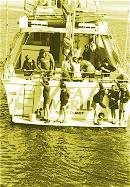|
‘Oceanographer for the day’
- Experiments on a field trip and back in the lab.
What
A hands on marine education programme for senior high school students.
Where
Aboard the Seaworld boat at the Gold Coast and then back at school.
How
|

Oceanographer for the day |
With cooperation and sponsorship from Wet Paper, Seaworld and the Gold Coast City Council a marine education programme for secondary school students was organised. It introduced practical methods for the examination of estuarine, waste, storm and oceanic water.
On a boat trip plankton samples where collected and examined. The turbidity and temperature of the sea water were also tested. Further samples were taken back to school to be analysed. These were tested for six of the nine testing protocols recognised world wide as indicators of pollution. In a later class, discussion and class activities were developed on water pollution, water conservation and the WaterWise concepts.
Why
This programme combined a fun, practical field trip with classroom activities. First hand experience is a very effective method of working with students on issues of water quality and catchment care. Not only did the students and teachers carry out the experiments but they also learnt techniques and methods of testing that can be used in the future, for testing other situations or environments. |